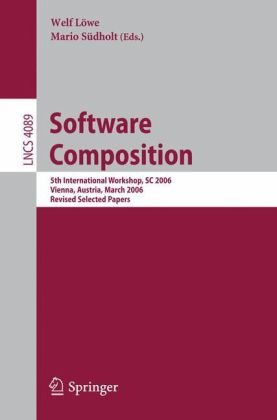

Most ebook files are in PDF format, so you can easily read them using various software such as Foxit Reader or directly on the Google Chrome browser.
Some ebook files are released by publishers in other formats such as .awz, .mobi, .epub, .fb2, etc. You may need to install specific software to read these formats on mobile/PC, such as Calibre.
Please read the tutorial at this link: https://ebookbell.com/faq
We offer FREE conversion to the popular formats you request; however, this may take some time. Therefore, right after payment, please email us, and we will try to provide the service as quickly as possible.
For some exceptional file formats or broken links (if any), please refrain from opening any disputes. Instead, email us first, and we will try to assist within a maximum of 6 hours.
EbookBell Team

4.3
88 reviewsResearch in software composition investigates models and techniques to build systems from prede?ned, pretested, reusable components instead of building them from scratch. In recent years, this idea has largely been adopted by - dustry. In the shape of service-oriented architecture, software composition has becomeanin?uentialdesignparadigm,especiallyforthe (re-)organizationofthe IT infrastructure of organizations.On the technical level, the standardization of Web services and other composition technologies has further matured. Current research in software composition aims at (further) developing c- position models and techniques. The aspect-oriented programming and design paradigm, for instance, has gained interest in the research community as a c- position (support) model. Other current research questions concern the sp- i?cation of component contracts, in particular making explicit its observable behavior, and methods of correct components composition. The International Symposium on Software Composition provides a premier forum for discussing these kinds of research questions and presenting original research results. This LNCS volume contains the proceedings of the 5th International S- posium on Software Composition, which was held as a satellite event of the European Joint Conferences on Theory and Practice of Software (ETAPS) in Vienna, Austria, March, 25-26 2006. The symposium started with a keynote on “Semantically Enabled Service-Oriented Architectures” given by Dieter Fensel, DirectoroftheDigitalResearchInstitute.Themainprogramconsistedofpres- tations of research papers on software compositions. These proceedings contain the revised versions of the papers presented at SC 2006.